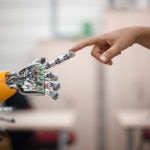Technological Progress: Risk or opportunity for employment?
The development of new technologies as a means to alleviate workloads is part of the day to day running of businesses. Increasingly, robots, artificial intelligence, and computer algorithms are taking over humans in the execution of mechanical tasks. However, many theoreticians are wary of the consequences this development will bring upon the workplace. Darrel M. West discusses the impact of these emerging technologies on society in the book 'The Next Step. Exponential Life', which can be downloaded for free from the BBVA OpenMind project website.

Computerization has helped to improve production, both in terms of speed and cost reduction. However, its dizzying growth is leading many to think that employment could be adversely affected in the short term. It is a fact that the number of industrial robots replacing human labor has increased worldwide. According to a study by RBC Global Asset Management, that automation costs in companies have dropped sharply.
This uncertainty about the impact that technology will have on society is stirring up a debate that is dividing experts. The pessimistic current, which includes economists Erik Brynjolfsson and Andrew McAfee, predicts that the technological process will be detrimental to workers who can only offer manual skills. This situation will lead to a destruction of employment and a sharp decline in wages, giving rise to a marginal class of permanently unemployed citizens.
| Download complete book | |||
|
|||
Other theoreticians refute these pessimistic predictions. While recognizing that, indeed, many jobs will disappear, they say new and better jobs will be created. Work will be transformed but humans will still be needed to supervise the work of the machines. These jobs will be more productive, and therefore pay higher wages.

"Work will be transformed but humans will still be needed to supervise the work of the machines"
Francisco González is one of these 'techno-optimists'. During the annual meeting of the International Advisory Panel of the Monetary Authority of Singapore, BBVA Group Executive Chairman stated that "the most digitized societies or economies with a greater intensity in the use of robots have very low unemployment rates. In 2016, the unemployment rate in the United States stood at virtually the same level recorded at the 20th century, despite rising productivity, population growth and the labor force increase. "Over this same period of time, per capita income multiplied by 7.4. "The experience of all these countries teaches us how technical progress translates into greater social well-being", he said.
According to BBVA Research, the outlook is also rather optimistic. Thanks to automation, new activities will be developed that will create new jobs. Automation and computerization will complement workers who perform non-routine and abstract tasks and will not affect those who perform more complex manual tasks. Robots, IoT, IA, and big data will start taking over tasks from some current activities, paving the way for the development of new ones as society becomes wealthier and more services are demanded. In addition, while living standards increase, we may also start seeing shorter work weeks.
Consequences for public policies
The rollout of technology in the workplace allows people become more productive in a very short time. Countries that have invested in robotics have experienced a boom in economic performance. West says that in the future, society may not need as many workers as it does today.
This is where the debate about the political and economic implications of emerging technologies arises. According to the author, a notable increase in the number of people without full-time employment would exacerbate differences within society and complicate the distribution of benefits such as pensions, health care and insurance. This possibility casts serious concerns over the current model, which links healthcare and pensions to employment. In an economy that requires much less workers, we will need to think about how to secure benefits for the unemployed. West analyzes measures that must be considered to deal with this situation.
Robots, artificial intelligence or big data will replace some positions, but better ones will be created". Francisco González
The first would be to create a welfare system that is not linked to the workplace. Were unemployment levels to reach unsustainable highs, the State would be required to find a way to develop the so-called 'flexicurity' or 'flexible security', breaking the direct link between benefits and employment.
The second solution would be to fund continuing training and retraining programs, with the aim of providing incentives for people to continue improving their education and training in adulthood, in order to keep up with a job market that constantly shifts due to rapid technological innovation. A proposal aimed at encouraging volunteer work is in the same line. West states that all analyses suggest that in the future we will need to weigh in the possibility of earning income new ways, other than full-time employment. Being required to work less hours will allow us to have more spare time, so he proposes to create credits to reward community contributions.
The author’s last proposal would be to bolster artistic and cultural agendas to occupy the free time. In his opinion, it will be essential for people to lead full lives, even if society needs fewer workers.
Despite different predictions about the impact of technology on society, West argues that we must pay attention to the coming changes and start tackling regulatory and job related issues. The challenge is to make the transition between the new jobs and those that are rendered obsolete as efficient and equitable as possible: protecting people, not jobs.


